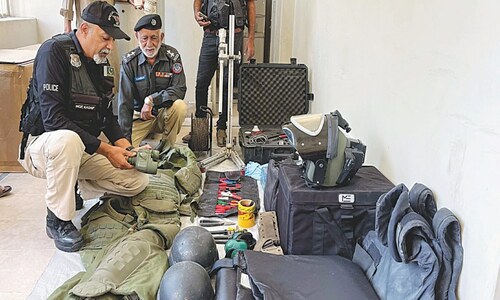KARACHI: Education, various forms of media and technology remained at the heart of all the panel discussions, talks, debates, presentations and interactive sessions on the second and final day of School of Tomorrow’s International Education and Cultural Festival ‘The End of Education’ organised by Beaconhouse School Systems at a hotel here on Sunday.
The keynote speech by Roger Schank, professor emeritus at the Northwestern University, on ‘School is not working’ proved enlightening when he offered suggestions such as shutting down high schools, stop preparing students for college and eliminating testing. Cheers and applause followed his every suggestion.
One of the panel discussions asked if media and technology controlled global thinking. Researcher and lecturer Dr Carl Olson said that an unthinking acceptance of whatever the media offered was very dangerous.
Vice Chancellor of LUMS Dr Sohail H. Naqvi compared the media to computerised tomography. “You can’t judge a patient’s condition by looking at just one image of a slice of the brain. You have to look at all the angles to ascertain the problem. Similarly, one can’t base his or her impression by just looking at one point of data shown through the media to get the complete picture,” he said.
Dr David Cole from the United States said that for his generation, the changes in the media happened slowly. “Before television, we listened to the radio and before the radio we had telephones. So for us the changes weren’t so rapid unlike today where you see new changes and discoveries in media taking place every few months,” he said. “Today, we see something on the Internet and think it must be true as it was on the net. But we can’t be passive receivers of information coming our way through the various forms of media.” He said instead of allowing the media to use you, you should use it instead.
Throwing more light on that, Dr Naqvi brought up the example of India. “India also has dirty streets and people living in terrible conditions but on their channels and in their monies they show beautiful homes and lovely sceneries fooling the world into thinking what a great land it is. If you don’t take advantage of your media, someone else will use it against you,” he said.
Meanwhile, Dr Olson said that when he posted on social media that he was going to Pakistan, he got reactions like “stay safe, look out and are you crazy!” He said that if he had been influenced by them, he would not have been present at the conference.
Another session focussed on the right to privacy, social norms and where to draw the line with journalists and activists Afia Salam and Gibran Nasir, actor Adnan Malik and fashion designer Hasan Sheheryar as the panelists.
Educationist Shanaz Wazir Ali and singer and social activist Shezad Roy made excellent points when talking from their own experience during a panel discussion on ‘Government schools: unlocking the potential’.
“Parents in countries like Japan and Korea send their children to government schools as the governments in those countries work to run those schools well. But in Pakistan, the narrative is very different,” she said.
Speaking about the enrolment issue in government schools, Ms Wazir Ali said that building more schools did not help there. “The students start dropping out as they get promoted to higher classes. What can work in this scenario is improving the quality of education and enabling or facilitating teachers in order to fix the content of education,” she said.
Shezad Roy, whose NGO, Zindagi Trust, adopted the Fatima Jinnah school for Girls in Karachi back in 2006 to completely turn it around and make a model school for others to follow their example said that they also, recently, took over the management of the Khatoon-i-Pakistan School but have been faced with opposition and disobedience from the teachers there to follow the rules such as arriving early and taking all their classes. “There were banners raised with wordings like ‘Shezad Roy gaye ga, hummen kia parhaye ga?’ Here you have huge protests of teachers coming out against the biometric system that can end ghost teachers. And the media shows such issues as larger than life. These are challenges we have to address,” he said.
Published in Dawn, November 30th, 2015












































